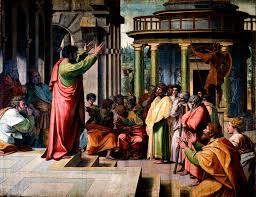 The Talmud is the gigantic Jewish reflection on the Hebrew Bible and especially its first five books. It contains much from which Christians can learn, even if Jews and Christians disagree on the identity of the messiah.
The Talmud is the gigantic Jewish reflection on the Hebrew Bible and especially its first five books. It contains much from which Christians can learn, even if Jews and Christians disagree on the identity of the messiah.
One string of reflection in the Talmud from which we can learn is its thinking about how Athens relates to Jerusalem. Reason vs. revelation. Human thinking vs. God’s unveiling of His own mind and works. Curt Biren is a student of Talmud who explains the rabbis on this: The best reason and God’s revelation will never conflict if the former is exercised in humility. Here is Biren’s take:
The spread of the coronavirus today has challenged our most fundamental notions of what we know and what we don’t know, even in our modern age of advanced medicine and technology. How could any virus be beyond the understanding of our accomplished scientists? It raises age-old questions about what we mortals can figure out ourselves and what is perhaps beyond human reasoning — invoking the enduring debate between Jerusalem and Athens. There is one ancient text that provides some answers.
The legacy of Jerusalem vs. Athens — revelation vs. reason — is legendary. It has led to untold conflict throughout the ages, even if, as some assert, western civilization is itself an uneasy blending of the two. Yet, there is one ancient Jewish collection of writings — the Talmud — that weaves the two traditions together into a coherent whole.
The Talmud, one of Judaism’s most sacred texts, consists of extensive interpretations and commentaries on the Hebrew Bible — covering everything from the spiritual to the practical, from issues of life and death to questions about morality and law. Its profound depth is matched by its voluminous scope. If one reads a page of it daily — which many do as part of the study program called Daf Yomi (Hebrew for a page a day) — it takes 7 1/2 years to finish it.
To be sure, portions of the Talmud are focused on halakha — religious laws and practices relevant primarily for the religiously observant. But much of the text addresses the great questions of life. It’s the source of so much that’s central and enduring in the Jewish tradition. And it constitutes a unique coalescence of reason and revelation.
For many today, reason is the guiding light of our secular world. Revelation is often viewed as antithetical to reason. For some, those immersed in religious life may seem to be guided by dogmas and superstitions, precluding any clear, rational thought. The Talmud reveals a very different picture.
The discussions and debates documented in the many pages of the Talmud actually exemplify the epitome of rational thinking. The ancient rabbis, in their quest for what’s true and right, ask question after question. Upon what is a particular idea based? What is the rationale for it? If it’s based upon an inference, is the inference valid? If it’s based upon an analogy, is the analogy an apt one? Is it logically consistent with other ideas?
When there are differing opinions, which happens often in the Talmud, what precisely is the disagreement? Can the differences be reconciled in some way? If not, how does one decide what’s right?
These and other deliberative questions are carefully addressed throughout the Talmud. The level of reasoning — of precise, rigorous, thoughtful, logical discourse — is extraordinary. It’s beyond what many of us are familiar with. It entails formal hermeneutical principles, which are so foundational they’re included in Jewish prayer books.
Many of the conclusions and judgments explained in the Talmud are d’rabbanan — from the rabbis. They’re the result of the ancient rabbis’ extensive thinking, interpretations and analyses. They push the limits of what we can know.
Yet, they have their own limits. Rulings that are d’rabbanan are typically not definitive. They lack the authority of the tradition’s foundational truths, its first principles. The ancient rabbis deferred to these first principles whenever possible.
What are these first principles? They are d’oraita — from the Torah. The Ten Commandments, for example, including ‘do not murder’ and ‘do not steal’, are first principles. They are deemed to be true in and of themselves. Such foundational truths may need to be carefully considered to fully understand their meaning and import, as well as their applications — no simple matter, as the Talmud makes abundantly clear — but their veracity requires no further reason or justification.
In this sense, while the Talmud is steeped in the most rational discourse conceivable, its first principles are grounded in the Torah’s moral truths — i.e., in God’s divine words revealed at Mt. Sinai. Within the pages of the Talmud, reason and revelation cohere together.
Today, a belief in God and His Biblical words is a leap of faith too great for many to make. While understandable within our secular culture, this does lead to an inevitable question. If one does not believe in revelation — in the Ten Commandments and other moral truths revealed in Scripture — then upon what first principles does one ground one’s ideas?
To this day, the tension continues between revelation and reason, between our Biblical tradition and our philosophical legacy, between Jerusalem and Athens. The Talmud demonstrates that there need be no conflict. To the contrary, for the Talmud, it’s inconceivable to imagine one without the other.
Curt Biren, who has written for First Things, Religion & Liberty and the Jewish Journal, recently completed Daf Yomi — the 7 1/2 year Talmudic study program.










